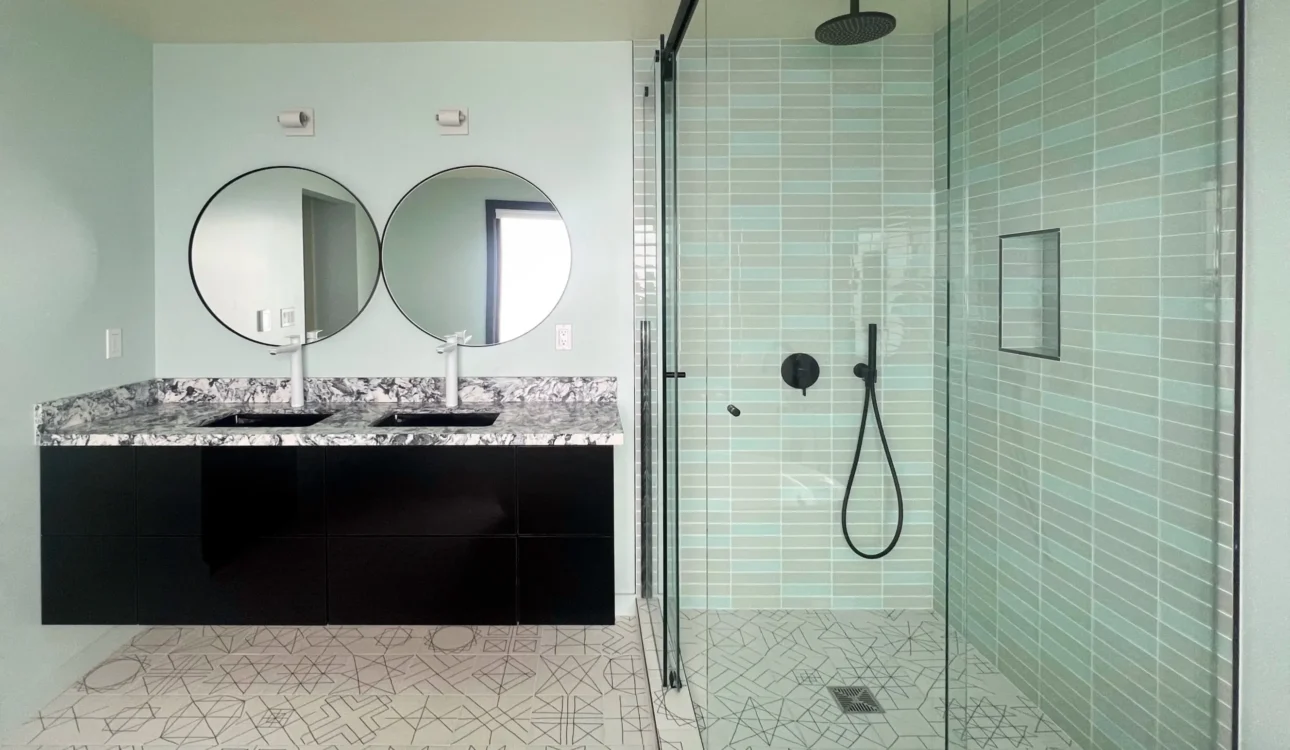Tile showers are a beautiful and durable choice for any bathroom, but to keep them looking their best, regular maintenance is essential. At Flooring RVA, we understand that maintaining your tile showers can seem daunting, but with the right tools and techniques, you can keep your shower tile and grout in pristine condition for years to come.
Establish a Regular Cleaning Routine
The first step in maintaining your tile showers is establishing a consistent cleaning routine. Regular cleaning prevents the buildup of soap scum, mold, and mildew, which can dull the appearance of your tiles and damage the grout. A simple daily or weekly cleaning schedule can go a long way in keeping your shower looking fresh.
Start by using a squeegee to remove excess water from the tiles after each shower. This prevents water spots and reduces the chance of mold and mildew forming in grout lines. For a quick clean, spray the tiles and grout with a mixture of warm water and white vinegar in a spray bottle. This solution is effective at cutting through soap scum and is safe for most tiles.
Choosing the Right Cleaning Products
Not all cleaning products are created equal, especially when it comes to cleaning shower tile and grout. Some products can be too harsh and damage the tiles or grout, while others may not be effective enough to remove tough stains. When selecting cleaning products for your tile showers, always choose ones that are designed specifically for tile and grout.
For a gentle yet effective cleaner, mix water and baking soda into a paste and apply it to the grout lines. Let it sit for about 15 minutes, then use a scrub brush to gently clean the grout. This method is particularly effective for removing stains and brightening grout lines without damaging them.
How to Deep Clean Your Tile Showers
Even with regular cleaning, your tile showers will occasionally need a deep clean to remove stubborn stains and buildup. For a thorough deep clean, start by applying a mixture of white vinegar and warm water to the tiles and grout using a spray bottle. Let the solution sit for about 10-15 minutes to break down soap scum and other residues.
Next, use a scrub brush to clean the tiles and grout, focusing on areas where dirt and soap scum have accumulated. For tougher stains, such as those caused by mold and mildew, you can use hydrogen peroxide. Apply it directly to the affected areas, let it sit for a few minutes, and then scrub gently.
If you’re dealing with particularly stubborn stains or grime, consider using a commercial grout cleaning product. Always test the product on an inconspicuous area first to ensure it won’t damage your tiles or grout. After deep cleaning, rinse the entire shower with warm water to remove any remaining cleaning solution.
Preventing Mold and Mildew in Tile Showers
Mold and mildew are common problems in tile showers due to the warm, humid environment. To prevent these issues, it’s important to keep your shower well-ventilated. An exhaust fan can help reduce humidity levels, making it less likely for mold and mildew to develop.
After each shower, leave the bathroom door open and run the exhaust fan for at least 15 minutes to help dry out the space. Additionally, using a daily shower spray that contains a mold inhibitor can help keep your tile showers mold-free.
Caring for Grout Lines
Grout lines are often the most vulnerable part of tile showers, as they can easily become stained and discolored over time. To keep your grout lines looking clean and fresh, it’s important to give them special attention during your cleaning routine.
For regular grout cleaning, use a solution of warm water and mild detergent. Apply it to the grout lines with a scrub brush, being careful not to scrub too hard, as this can wear down the grout. For deeper cleaning, a paste made from water and baking soda can be applied to the grout, left to sit for 15 minutes, and then scrubbed away.
Sealing your grout lines is another effective way to protect them from stains and moisture. A grout sealer acts as a barrier, making it more difficult for dirt and water to penetrate the grout. It’s recommended to reseal grout lines once a year to maintain their appearance and durability.
Handling Tough Stains on Tiles or Grout
Sometimes, despite your best efforts, tough stains can appear on your tiles or grout. These can be caused by a variety of factors, including hard water, soap scum, or mold and mildew. When dealing with tough stains, it’s important to use the right approach to avoid damaging your tile showers.
For hard water stains, a mixture of white vinegar and water is often effective. Apply the solution to the stained areas, let it sit for a few minutes, and then scrub with a soft brush. For soap scum, a commercial cleaner designed for tile showers may be necessary. Follow the manufacturer’s instructions carefully, and always rinse the area thoroughly with warm water afterward.
If you’re dealing with mold or mildew stains, hydrogen peroxide is a great option. Apply it directly to the stained area, let it sit for a few minutes, and then scrub gently with a brush. For particularly stubborn stains, you may need to repeat the process several times.
Tips for Long-Term Tile Shower Maintenance
Maintaining tile showers doesn’t have to be a time-consuming chore. By incorporating a few simple habits into your routine, you can keep your shower looking beautiful and functional for years to come.
One key tip is to avoid using abrasive cleaning tools, such as steel wool or harsh scrubbing pads, which can scratch the surface of your tiles. Instead, use a soft cloth or a non-abrasive scrub brush to clean your tiles and grout.
Another important tip is to address any issues as soon as they arise. If you notice a small spot of mold or a stain on your grout, take care of it right away before it has a chance to spread. Regularly inspecting your tile showers for signs of damage or wear can help you catch problems early and prevent them from becoming bigger issues.
Finally, consider applying a grout sealer every year to keep your grout lines protected from moisture and stains. This simple step can greatly extend the life of your grout and keep your tile showers looking like new.
At Flooring RVA, we believe that with the right care and maintenance, tile showers can remain a beautiful and functional part of your bathroom for many years. Whether you’re looking for advice on cleaning products, grout cleaning techniques, or just want to learn more about the best ways to maintain your shower tile and grout, our team is here to help.







